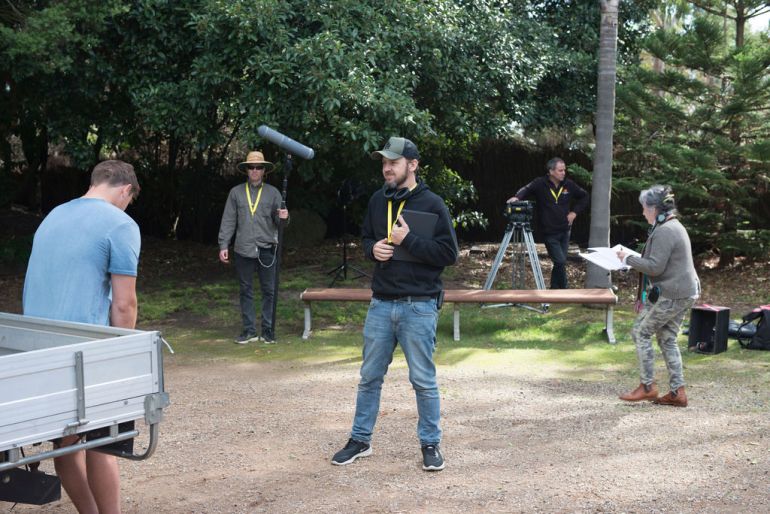Tony Gardiner on the set of ‘Neighbours’, with social distancing measures in place.
While COVID-19 protocols have meant Neighbours director Tony Gardiner has had to ‘un-learn’ 25 years of on set habits, he believes everyone in the industry can and will adapt to such ways of working.
Further, he reports that the integrity of the serial drama’s storylines remain firmly intact.
Fremantle’s Neighbours restarted shooting in late April; the first TV drama in Australia to resume after COVID-19 shutdowns.
A return to set has meant the implementation of social distancing and health protocols including an on set nurse, no physical contact between actors, no make up for male actors or touch-ups for female actors, and no outside extras.
The Melbourne studio has been divided into quadrants with an operational hub, three distinct production teams and only three actors allowed to cross between the units. No more than 100 people per day are allowed in any area.
In many ways, Neighbours is a test-case for the rest of the industry; Fremantle’s learnings are informing the protocols being developed by AFTRS, Screen Australia, the state agencies, Screen Producers Australia and the major guilds.
With a background as a cinematographer, Gardiner starting directing on Neighbours in August last year, after having previously worked on Home and Away.

He was shooting his block when the shutdown occurred. He commends Fremantle for the inclusive way it communicated with cast and crew throughout the hiatus, and for its focus on bringing everyone safely back to work.
The mood on set since shooting resumed is positive, he reports. “We know we’re one of the very few crews working in the world. People are very thankful and very keen to make it all work so we can keep working safely.
“After my first week of shooting… and looking at the edit, the storylines, the integrity of the show is still there, which is a great feat from everyone involved, from the producers right down to the runners. Everyone’s got on board and made these restrictions work.”
Gardiner reports an “adjustment period” to the protocols with regards to things like the handling of gear – it must be sanitised in between each person’s use – and how he communicates with crew like continuity.
Scripts have been altered to have less actors in a scene, and scenes have to be blocked in such a way that observes social distancing. Longer lenses are being used to make actors seem closer together.
But Gardiner is encouraged by the fact, that for the most part, it’s felt like a normal Neighbours block.
In some ways, he’s actually enjoyed the challenge of working out how to hit story beats through the restrictions.
“There are little adjustments… But generally, once you get used to those, it does go back to feeling like just the core principles of directing – you’re still just trying to tell a story and it’s what tools are available to you to tell that story.”
Romance being an integral part of any soap, Gardiner has had to find workarounds to convey connection and intimacy even though actors cannot touch.
“It’s made me rely on one of the great joys of filmmaking: problem solving. This is a hell of a problem-solve.”
While camera trickery is part of it, Gardiner says it predominantly comes down to actors’ performance.
“You’re having to rely on them emoting in different ways; conveying that emotion with their words, expressions and general body language.”
Gardiner predicts that working under COVID-19 protocols will be a retraining process for industry, but stresses the sector is adaptable. After watching friends lose work, and being very concerned for the Australian screen industry as a whole, he is buoyed there is a pathway back on track.
“I count myself incredibly lucky to be one of the few directors working in Australia at the moment. It’s something that I don’t take for granted in any way, shape or form.
“For me, being one of the first back, seeing that there is a future and there is a way forward, has been really encouraging. That this can be adapted to other models in the near future is very encouraging. I have a lot of hope for the Australian industry in the next few months.”


